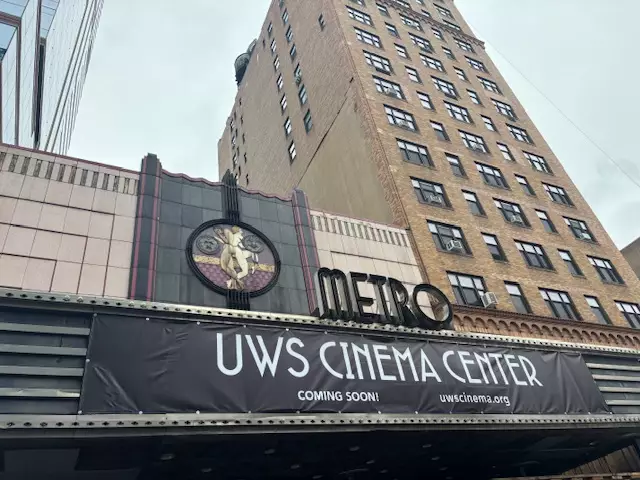The Metro Theater, a once vibrant hub of cinematic experiences located at Broadway and 99th Street, has been granted a second chance at life. The news of its impending renovation into a five-screen arthouse theater brings a wave of nostalgia and excitement to the Upper West Side. Supported by significant grants from both state and city funds, as well as generous donations from prominent philanthropists, this ambitious project aims to resurrect a cultural epicenter that has seen a worrying decline. The Upper West Side Cinema Center, a newly established nonprofit headed by producer Ira Deutchman and co-founder Adeline Monzier, is spearheading this effort to reclaim the area from its reputation as a “cinema desert,” which emerged following the closure of the Lincoln Plaza Cinema.
The Community’s Voice and Collective Effort
What sets this initiative apart is the overwhelming grassroots support it has garnered. The local community has rallied behind the project, speaking volumes about the need for a dedicated arts venue in a neighborhood that has been deprived of such experiences for far too long. Moreover, the backing from notable filmmakers like Martin Scorsese and Frances McDormand serves as a testament to the project’s significance within the wider film community. Their support affirms that even during challenging times, there exists a strong desire to revitalize the cinematic landscape through artistic films that reflect diverse narratives and provoke thoughtful conversations.
The project has not only reignited interest in the theater itself but also fostered a sense of unity among local residents. Organizations such as the New Friends of Metro Theater have been pivotal in advocating for the venue’s restoration, demonstrating how collective efforts can lead to meaningful change. This collaborative spirit heralds a new era of engagement where the arts become a focal point of community interaction.
More Than Just a Theater
This endeavor is about much more than simply reopening a theater; it is an opportunity to restore the community fabric that has frayed over the years. The envisioned space is not limited to film screenings but will also include an education center and a cozy café that opens to the bustling street, inviting passersby to immerse themselves in the cultural offerings. The addition of an education center signals a commitment to nurturing future generations of filmmakers and cinephiles alike, ensuring the art of cinema continues to thrive.
Ira Deutchman’s sentiments resonate with a collective longing for a gathering space that fosters community interactions and shared experiences. The Metro Theater, with its illustrious Art Deco design, serves as a canvas on which new stories can be painted, promoting connections among neighbors and cultural exchange. The sense of immediacy surrounding the project, emphasizing the need to create a cultural hub, reflects a significant trend in urban centers: the desire to combat societal fragmentation with venues that offer immersive and enriching experiences.
Resilience Against Adversity
With an estimated budget of $15 to $22 million, the project does hinge on continued financial enthusiasm from the public and private sectors. A significant boost was provided by Governor Kathy Hochul’s $3.5 million discretionary grant, which played a crucial role in ensuring the acquisition went through. Such support signifies the recognition among political leaders of the arts’ role in shaping vibrant communities. Hochul’s declaration that the Metro Theater once stood as a “silent reminder” of cultural vibrancy poignantly encapsulates the journey that lies ahead—taking a historical landmark and reviving it to become not just a place to watch films but a venue for dialogue and connection.
The commitment to restoring the theater’s façade honors its historical significance while breathing new life into its purpose. The integration of contemporary cinema with classic films and indie productions provides a platform for diverse stories, reflecting the evolving tapestry of modern society. In an age where digital distractions often overshadow communal experiences, the return of the Metro Theater symbolizes hope for revitalizing a cultural landscape that resonates with both nostalgia and innovation.
A Vision for the Future
As the Upper West Side Cinema Center embarks on its journey toward realizing this vision, the outlook is robust, encouraged by the optimism surrounding the project. Deutchman’s ambitious goal to have the theater operational within three years reflects a pressing need not only for entertainment but for artistry that enriches life. The reawakening of the Metro Theater could very well serve as a catalyst for similar initiatives in urban areas facing cultural isolation.
In a world where digital screens have taken over our collective viewing experiences, the revival of a communal theater space is nothing short of revolutionary. It’s a bold statement against the allure of isolation, reminding us that at its core, cinema is a shared experience—one that thrives in spaces filled with laughter, tears, and thoughtful discourse. The Metro Theater’s story isn’t just about rekindling a love for film; it is about reclaiming a vital part of community identity, an invitation to gather and explore the art that binds us as human beings.

